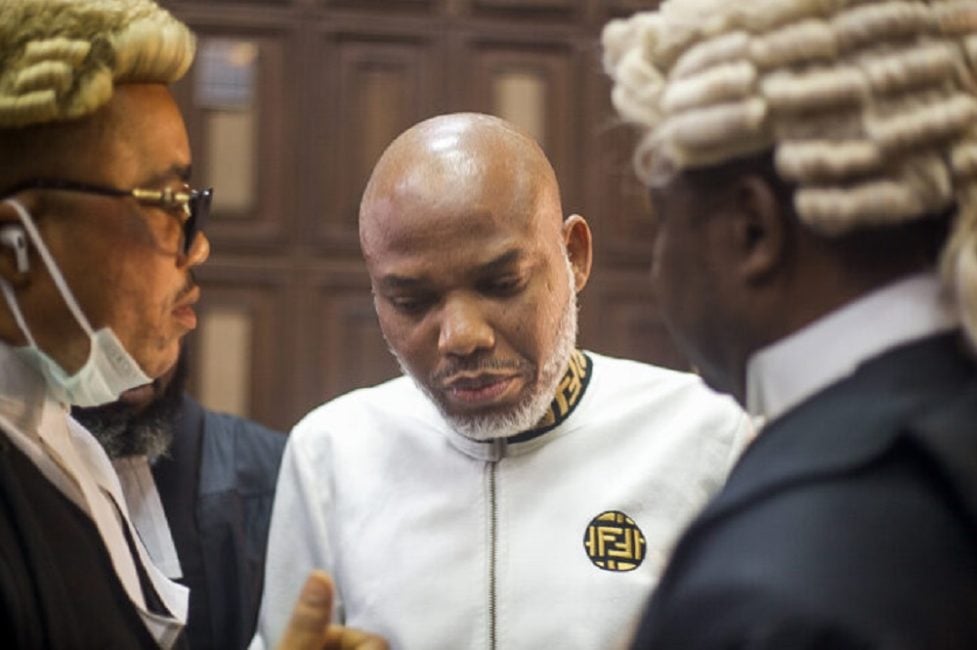The ongoing legal battle of Nnamdi Kanu, the leader of the Indigenous People of Biafra (IPOB), has taken another twist with a scheduled hearing before Justice Binta Nyako of the Federal High Court, Abuja, on February 10, 2025. This new development comes despite Kanu’s explicit request for Justice Nyako’s recusal and a subsequent transfer of his case to the South-East region of Nigeria. The hearing notice, received by Kanu’s lead counsel, Aloy Ejimakor, has sparked surprise and apprehension within the defense team, who have vowed to appear but with “bated breath”, given the complex history of the case and the contentious relationship between Kanu and the presiding judge.
The core of the contention revolves around Justice Nyako’s continued involvement in the case despite her earlier recusal. During a court session in September 2024, Kanu expressed a lack of confidence in Justice Nyako’s impartiality and formally requested her withdrawal from the trial. Justice Nyako acceded to this request and transferred the case file to Justice Tsoho. However, in a move that surprised many, Justice Tsoho returned the file back to Justice Nyako, effectively reinstating her as the presiding judge. This decision has been fiercely contested by Kanu and his legal team, who argue that Justice Nyako’s continued involvement constitutes a violation of her own judicial order and undermines the integrity of the legal process.
Kanu’s legal team, led by Ejimakor, has consistently emphasized their client’s distrust of Justice Nyako and the potential for bias in the proceedings. They maintain that Justice Nyako’s previous recusal is legally binding and should preclude her from any further involvement in the case. The defense argues that forcing Kanu to stand trial before a judge he has explicitly rejected creates an environment of perceived injustice and raises concerns about the possibility of a fair trial. This sentiment has been echoed by many of Kanu’s supporters, further fueling the controversy surrounding the case.
In an attempt to resolve this impasse, Kanu, through his legal team, has formally requested the transfer of his case to a High Court in the South-East region. This request is based on several arguments. Firstly, the defense argues that since no other judge in the Abuja division seems willing to take on the case after Justice Nyako’s recusal and subsequent reinstatement, a transfer to a different jurisdiction becomes necessary to ensure a fair hearing. Secondly, they contend that the alleged offences related to Kanu’s activism have a direct impact on the South-East region, making the High Courts in that area more appropriate venues for the trial. They argue that this regional connection provides the South-East divisions with a superior jurisdictional claim compared to Abuja.
The defense’s request for a transfer to the South-East also carries significant symbolic weight. The South-East region is the heartland of the Igbo ethnic group, to whom Kanu belongs, and is also the central focus of the IPOB’s separatist aspirations. Holding the trial in this region, the defense argues, would not only be logistically more convenient for witnesses and those affected by the case, but also demonstrate a commitment to ensuring that the trial is perceived as fair and impartial by the community most directly impacted by the proceedings. The defense has stressed that granting this request would be a crucial step in upholding the principles of justice and ensuring a fair trial for Kanu.
The hearing notice for February 10, 2025, sets the stage for a potentially crucial juncture in Kanu’s ongoing legal battle. The defense is expected to reiterate their objections to Justice Nyako’s involvement and formally push for the transfer of the case to the South-East. The prosecution, on the other hand, will likely argue for the continuation of the trial in Abuja under Justice Nyako. The court’s decision on this matter will have significant implications for the future of the case and will be closely watched by both supporters and critics of Kanu, as well as those concerned about the integrity of the Nigerian judicial system. The hearing presents an opportunity for the court to address the concerns raised by the defense and demonstrate its commitment to due process and the impartial administration of justice.


